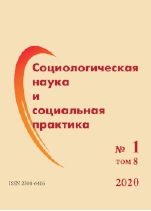Почему социальное развитие приводит к разладу человека с природой
Аннотация
Литература
Варшавский, А. Е. Проблемные инновации: риски для человечества: Экономические, социальные и этические аспекты. М.: URSS, 2018. 328 с.
Горшков, В. Г. Физические и биологические основы устойчивости жизни. М.: ВИНИТИ, 1995. 470 с.
Гринберг, Р. С., Рубинштейн, А. Я. Экономическая социодинамика. М.: ИСЭ-Пресс, 2000. 278 с.
Данилов-Данильян, В. И. Возможна ли коэволюция природы и общества? М.: Экопресс, 1998. 20 с.
Доклад о климатических рисках на территории Российской Федерации. Росгидромет. СанктПетербург, 2017. 106 с. [Электронный ресурс] // Климатический центр Росгидромета: [сайт]. URL: https://cc.voeikovmgo.ru/images/dokumenty/2017/riski.pdf (дата обращения: 23.09.2019).
Иванов, О. П., Снакин, В. В. Глобализация с позиций экологии, синергетики и теории сложных систем // Век глобализации. 2016. № 4 (20). С. 3–12.
Маркс, К. Капитал. Том первый // Маркс К., Энгельс Ф. Сочинения. М.: Госполитиздат, 1960. Т. 23.
Маркс, К. Тезисы о Фейербахе // Маркс К., Энгельс Ф. Сочинения. М.: Госполитиздат, 1955. Т. 3.
Маркс, К., Энгельс, Ф. Святое семейство, или критика критической критики против Бруно Бауэра и компании // Маркс К., Энгельс Ф. Сочинения. М.: Госполитиздат, 1955. Т. 2.
Моисеев, Н. Н. Современный рационализм. М.: МГВП КОКС, 1995. 376 с.
Порфирьев, Б. Н., Макарова, Е. А. Экономическая оценка ущерба от природных бедствий и катастроф [Электронный ресурс] // Вестник Российской академии наук. 2014. Т. 84. № 12. С. 1059–1072. URL: http://www.ras.ru/FStorage/Download.aspx?id=4e5392e3-90c6-4617-afceb23b310ae7ad (дата обращения: 10.03.2016). DOI: 10.7868/S0869587314120123
Снакин, В. В. Путь к устойчивому развитию: мифы и реальность // Век глобализации. 2016. № 1–2. С. 80–86.
Социология Ядова: методологический разговор [Избранные труды В. А. Ядова] / ФНИСЦ РАН; Ред. сост., авторы предисл.: Е. Н. Данилова, Л. А. Козлова, П. М. Козырева, О. А. Оберемко. М.: Новый хронограф, 2018. 944 с.
Федотов, А. П. Глобалистика: Начала науки о современном мире: Курс лекций / А. П. Федотов. М.: Аспект Пресс, 2002. 224 с.
Чумаков, А. Н. Глобальный мир: столкновение интересов: монография. М.: Проспект, 2018. 512 с.
Элиас, Н. Общество индивидов: пер. с нем. М.: Праксис, 2001. 336 с.
Эрроу, К. Дж. Коллективный выбор и индивидуальные ценности: пер. с англ. / К. Д. Эрроу; науч. ред. пер., авт. предисл., послесл. Ф. Т. Алескеров. М.: Издательский дом ГУ ВШЭ, 2004. 204 с.
Яницкий, О. Н. Социобиотехнические системы: новый взгляд на взаимодействие человека и природы // Социологическая наука и социальная практика. 2016. Т. 4. № 3. С. 5–22. DOI: https://doi.org/10.19181/snsp.2016.4.3.4574.
Hardin, G. The Tragedy of the Commons // Science, New Series, Vol. 162, N 3859 (Dec. 1968), pp. 1243–1248. [Электронный ресурс] // URL: http://www.jstor.org/stable/1724745 (дата обращения: 15.09.2019).
Inclusive Wealth Report 2018: Executive Summary. [Электронный ресурс] // URL: https://wedocs.unep.org/bitstream/handle/20.500.11822/26776/Inclusive_Wealth_ ES.pdf?sequence=1&isAllowed=y (дата обращения: 30.10.2019).
The New Climate Economy. The 2018 Report of the Global Commission on the Economy and Climate. [Электронный ресурс] // URL: https://newclimateeconomy.report/2018/wp-content/ uploads/sites/6/2019/04/NCE_2018_Report_Full_FINAL.pdf (дата обращения: 01.11.2019).
Upton, S. Air Pollution’s True Costs // Project Syndicate [Электронный ресурс] // URL: https://www.project-syndicate.org/commentary/human-cost-of-air-pollution-by-simon-upton-2016-08 (дата обращения: 15.12.2016).
Weizsȁcker, E. U. von, Wijkman, A. Come on! Capitalism, Short-termism, Population and the Destruction of the Planet. Prepared for the Club of Rome’s 50th Anniversary in 2018. New York: Springer, 2018. 220 p.
Wending, Z. A., Emerson, J. W., Esty, D. C., Levy, M. A., de Sherbinin, A., et al. 2018 Environmental Performance Index. New Haven, LT: Yale Center for Environmental Law & Policy. [Электронный ресурс] // URL: https://epi.envirocenter.yale.edu/downloads/epi2018reportv06191901.pdf
Поступила: 25.10.2019
Опубликована: 01.04.2020








 Издатель: Федеральное государственное бюджетное учреждение науки
Издатель: Федеральное государственное бюджетное учреждение науки